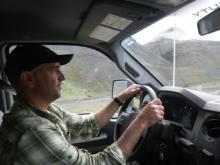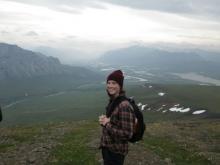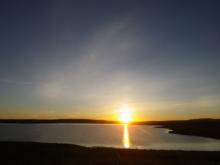Update
Bruce hosted a great PolarConnect Event, a live webinar event, from the field. Check out the archive of the event in the PolarConnect Archives.
What Are They Doing?
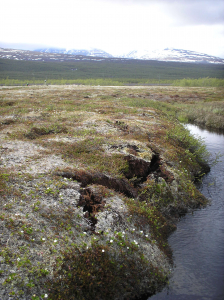
The research team is trying to understanding exactly how sunlight and bacteria degrade dissolved organic matter by determining how fast these processes convert newly released dissolved organic matter to carbon dioxide, compared to dissolved organic matter already in surface waters. The team will accomplish their research objectives with a series of laboratory experiments to determine rates of photodegradation and microbial processing of dissolved organic matter from different sources, and a series of landscape comparisons and sampling transects to characterize dissolved organic matter degradation in small basins and large rivers extending from the headwaters to the Arctic Ocean. Ultimately, this research will attempt to answer questions such as whether carbon export from tundra to oceans will rise or fall and how reactive the exported carbon will be. The team hopes to be able to measure the ultimate impact of impending disturbances, including climate change, on the net carbon balance of the Arctic and its interaction with the global carbon cycle.
Where Are They?
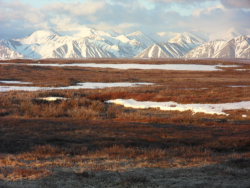
Latest Journals

Dr. Rose Cory works in the Arctic where climate warming is thawing frozen soil which may release tremendous stores of dissolved organic carbon to the Earth's surface. After having been trapped for millennia in the frozen soils this new carbon then becomes part of the modern carbon cycle. Dr. Cory finds that exposure to sunlight accelerates the return of this dissolved organic carbon to the atmosphere as carbon dioxide, which may further increase the rate of global warming. Because climate change is influencing our planet's evolution, understanding the fate of newly released carbon will help predict our future as a planet and society. Read more about Dr. Cory and her research here

George W. Kling is a professor in the Department of Ecology and Evolutionary Biology at the University of Michigan. He primarily studies aquatic ecology and biogeochemistry, and his research has focused on carbon and nutrient cycling, on using stable isotopes to understand trophic interactions, and on the integration of lakes and streams in a landscape context. His recent research has examined the role of microbial diversity in ecosystem function. He has worked internationally on arctic lakes and streams for approximately 25 years, and on tropical lakes in Africa.
Kling's scientific outreach to the public through interviews about his research on climate change and on the killer lakes of Cameroon includes articles in magazines and newspapers (e.g., National Geographic, Smithsonian), T.V. and radio broadcasts (e.g., CNN, BBC), and television films (e.g., BBC, Discovery). He has met regularly with U.S. Congress members to discuss issues of climate change and scientific integrity, and was lead author of the Union of Concerned Scientists – Ecological Society of America publication 'Confronting Climate Change in the Great Lakes Region' (2003). Kling is an associate editor for Limnology and Oceanography (2001-), an elected Fellow of the American Association for the Advancement of Science (1997-), and received a National Academy of Science Young Investigator Award (1993), a NSF Presidential Faculty Fellowship (1995), the United Nations Sasakawa Award (Certificate for Disaster Reduction, 2001), and the ASLO Ruth Patrick Award (2007).


